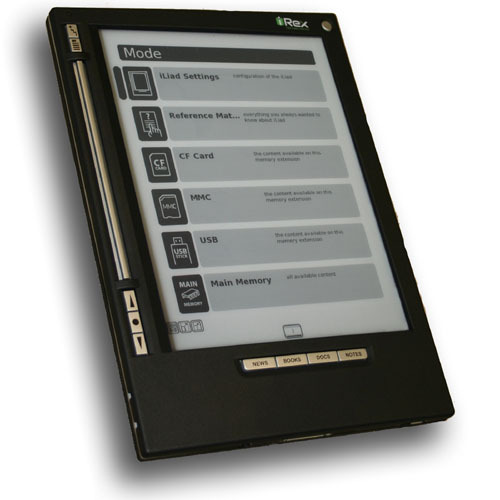iRex review
The latest digital book reader offers a pin-sharp greyscale screen and supports a range of free book formats. But does it make us want to start a book bonfire?

Books: the last bastion of old-world technology or the first salvo in a centuries-long technological journey to the present? After all, before Gutenberg came along with his high-tech printing press, books were ‘illuminated’ by monks with bad eyesight.
But the latest digital book reader suggests that it’s time to go digital on your library. We’ve seen it all before, not least from Sony’s Reader, but the Iliad sets the pace in terms of digital reading.
Book assassin
It takes a lot to prise a paperback from our hands – even our iPod and PSP only provide supplemental entertainment, and if you want to suggest we read on our laptop or PDA then you can take a step outside right now. But the Iliad soon had us forgetting that we were looking at a screen rather than turning pages.
It’s close to A5-sized, but incredibly thin and light, and the 1024×768 screen that takes up most of the front offers 16 shades of grey. That may not sound exciting, but its flat, lifeless appearance is better for sustained reading than the shiny screens we’re used to.
Massive Library
The amount of books you can store on here is amazing. We had room for Dracula, Crime and Punishment, Anna Karenina and the complete lyrics of the Beatles without even denting the 128MB – War and Peace only takes up just 3MB. Plus you can add to that with SD cards.
The size of the books is as much to do with the way they are digitised as the number of words, and this also has a dramatic impact on how easy they are to read. Two books digitised as PDFs can produce wildly different experiences – one is excellent, just like reading a novel, while the other never lets us forget we were staring at a screen.
Flipping pages
Apart from that we have few complaints. It’s dead easy to use with a nice bar at the side of the screen for turning pages. It has good battery life, and easily manages to get you to and from work with three hours of commuting. We also like the Wi-Fi connectivity for downloading books, and subscriptions services – such as newspapers, which you don’t need to sign up to – and the ability to make notes.
And while you might baulk at paying £450 for a ‘book’, if you take into account all the free reading material that’s available it’s a bargain. If you work your way through the entire 19,000 strong library of the Gutenberg Project that works out at a jot over 2p a book – better than any charity shop we’ve come across.
Use it with…
Stuff Essentials – In-ear headphones



